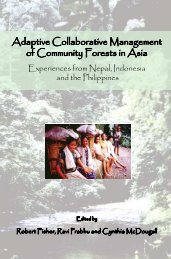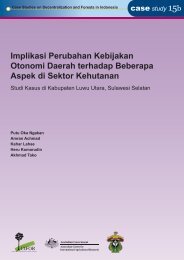Where the power lies: multiple stakeholder politics over natural ...
Where the power lies: multiple stakeholder politics over natural ...
Where the power lies: multiple stakeholder politics over natural ...
Create successful ePaper yourself
Turn your PDF publications into a flip-book with our unique Google optimized e-Paper software.
Forestry Commission and <strong>the</strong> communities<br />
There are indications that <strong>the</strong> level of hostility varies across RMCs and within villages. For<br />
example, at Ndarire and Gababe RMC meetings <strong>the</strong> researchers were forced to c<strong>over</strong> <strong>the</strong> FC<br />
insignia on <strong>the</strong> car to dissociate <strong>the</strong>m from <strong>the</strong> organization. Across Batanai RMC, attitudes<br />
towards <strong>the</strong> organization are very variable; some villages are more violently opposed to <strong>the</strong><br />
FC than o<strong>the</strong>rs. In most villages, <strong>the</strong> Forestry Protection Unit (FPU) is very unpopular. Some<br />
of <strong>the</strong>se FPU are not from this area. They are responsible for enforcing rules and by laws for<br />
using <strong>the</strong> resources. The FPU is thought to have unorthodox ways of prosecution. FPU<br />
members are accused of soliciting for sex so <strong>the</strong>y can ignore transgressions. They charge<br />
and apprehend <strong>the</strong> fa<strong>the</strong>r for <strong>the</strong> crimes of <strong>the</strong>ir wives or children ra<strong>the</strong>r than <strong>the</strong> perpetrator<br />
of <strong>the</strong> crime. Local people condemn <strong>the</strong> use of guns by <strong>the</strong> Forestry Commission because<br />
<strong>the</strong> FPU shoot all dogs found in <strong>the</strong> forest. When <strong>the</strong> people are angry at <strong>the</strong> FPUs, <strong>the</strong>y<br />
sometimes set <strong>the</strong> forest on fire causing fur<strong>the</strong>r damage for <strong>the</strong> forest. Some respondents<br />
claim that in general poaching in <strong>the</strong> forest has increased ra<strong>the</strong>r than declined in <strong>the</strong><br />
forest. One user explained that sometimes poaching is inevitable because <strong>the</strong> procedures<br />
for getting permits are so ineffectual and <strong>the</strong>re is too much bureaucracy involved in getting<br />
<strong>the</strong> permit. Fur<strong>the</strong>r, <strong>the</strong> fact that resources are not necessarily found in your RMC means<br />
that users from one can go to ano<strong>the</strong>r RMC and poach <strong>the</strong>re. Local villagers are still suspicious<br />
of <strong>the</strong> FC’s intentions. Their actions and programs still put <strong>the</strong> forest ra<strong>the</strong>r than people<br />
first. Thus one local respondent observed, ‘a leopard does not change its spots’ suggesting<br />
that <strong>the</strong> FC would never change and that even if it did, local <strong>stakeholder</strong>s would find it<br />
difficult to believe that it desires genuine collaboration.<br />
Politicians<br />
Local respondents described politicians, <strong>the</strong> war veterans and <strong>the</strong> youth brigade as very<br />
<strong>power</strong>ful. They were described as <strong>the</strong> new <strong>power</strong> elites. One respondent stated that<br />
‘This is <strong>the</strong>ir time. Now <strong>the</strong>y are very <strong>power</strong>ful and <strong>the</strong>ir activities and decisions are<br />
unquestioned. We have to consult <strong>the</strong>m <strong>over</strong> everything we do; <strong>the</strong> general atmosphere<br />
of fear and hate has been created to divide us.’ Some respondents described this group<br />
of <strong>stakeholder</strong>s as ‘untouchables, <strong>the</strong> new elites’ while o<strong>the</strong>rs reflected on <strong>the</strong> period<br />
immediately after independence in 1980 when this same group had held what was regarded<br />
as ‘absolute <strong>power</strong>’. Thus in many respects many respondents predicted that this phase<br />
was part of a cycle that will wane like o<strong>the</strong>rs before it.<br />
1.5 Application of results for <strong>the</strong> CIFOR social learning project<br />
One of <strong>the</strong> key areas of intervention for <strong>the</strong> social learning project is to facilitate effective<br />
collaborative relationships among <strong>stakeholder</strong>s. To achieve this objective, <strong>the</strong> ACM<br />
research team need to have <strong>the</strong> following<br />
Some background on <strong>the</strong> policy and legal framework for joint forestry management<br />
in Zimbabwe;<br />
An appreciation of <strong>the</strong> range of <strong>stakeholder</strong>s involved in <strong>the</strong> joint forest management<br />
project;<br />
A clear understanding of how <strong>power</strong> is configured in <strong>the</strong> project;<br />
A sense of how dynamic relations between and among <strong>stakeholder</strong>s are in <strong>the</strong> joint<br />
forestry management project.<br />
On <strong>the</strong> basis of <strong>the</strong> data collected in this phase of <strong>the</strong> work we can state that a clear<br />
framework exists for <strong>the</strong> successful implementation of joint forest resource management<br />
projects in Zimbabwe. However, in practice such projects rarely reflect <strong>the</strong> principles<br />
19

















